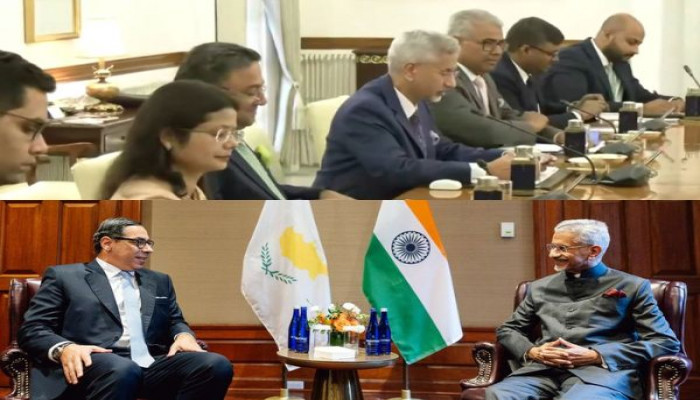EAM Jaishankar reaffirms India-Cyprus friendship, praises support on terrorism and global forums
- In Reports
- 07:48 PM, Oct 30, 2025
- Myind Staff
External Affairs Minister S Jaishankar on Thursday reaffirmed the close relationship between India and Cyprus, calling the two countries "trusted friends and reliable partners."
"India and Cyprus are trusted friends and reliable partners. Trust and time-tested are not easy adjectives to use nowadays, but I can do that with a great deal of confidence and assurance for this relationship," Jaishankar said, highlighting the strength and long-standing nature of the partnership.
He thanked Cyprus for its steady support to India on key issues, especially in the fight against cross-border terrorism.
"We deeply appreciate Cyprus's consistent support on issues of core interest to India, especially in our battle against cross-border terrorism. I would once again thank your government for the strong condemnation after the Pahalgam terrorist attack and the solidarity expressed with India in our fight against terrorism," he said.
Jaishankar also appreciated Cyprus’s continued support for India’s campaign for a permanent seat in the United Nations Security Council and for membership in the Nuclear Suppliers Group.
"We also appreciate your consistent support for India's Permanent membership in an expanded UN Security Council and for the membership of the Nuclear Suppliers Group," he stated.
Reiterating India’s position on Cyprus, he said, "India reiterates its unwavering support for the sovereignty, unity, and territorial integrity of the Republic of Cyprus and for a bi-zonal, bi-communal federation with political equality, in accordance with the relevant UN Security Council Resolutions."
Jaishankar’s remarks came during the visit of Cyprus Foreign Minister Constantinos Kombos to India, reflecting the deep mutual trust that defines the two countries’ diplomatic ties.
The visit was aimed at reviewing the progress of the India-Cyprus Action Plan 2025-29, demonstrating the shared commitment of both sides to strengthen relations and advance their comprehensive partnership.
In a post on X, the Ministry of External Affairs said, "A warm welcome to FM @ckombos of the Republic of Cyprus on his first official visit to India. An opportunity to review progress in implementation of India-Cyprus Action Plan 2025-29 and discuss the Comprehensive Partnership."
Kombos’s visit followed Prime Minister Narendra Modi’s trip to Cyprus earlier in June, which ended with the signing of a Joint Declaration that outlined a roadmap for deeper strategic cooperation between the two countries.
Later, the Ministry of External Affairs and the Government of Cyprus issued coordinated statements highlighting the wide scope of this renewed partnership and their shared goal of strengthening EU-India relations.
As Cyprus prepares to take over the Presidency of the Council of the European Union in early 2026, both nations are committed to working towards the timely completion of the EU-India Free Trade Agreement by the end of 2025, calling it a step of "significant economic and strategic potential."
According to the Prime Minister’s Office, Modi’s visit, the first by an Indian Prime Minister to Cyprus in more than two decades, was described as a "historic milestone" that "reaffirms the deep and enduring friendship between the two nations."
The joint declaration described the visit as both a recognition of the shared past and a "forward-looking partnership" based on strategic vision and mutual trust.
It stated that both leaders held wide-ranging discussions on bilateral, regional, and global matters, acknowledging the growing cooperation in economic, technological, and people-to-people areas.
India and Cyprus also pledged to continue working together "as trusted and indispensable partners contributing to regional and global peace, prosperity, and stability."
The declaration reaffirmed their shared values, including democracy, multilateralism, rule of law, and sustainable development, along with their commitment to a rules-based international order built on the UN Charter and international law.







Comments